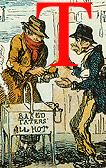'Your decisions are perfectly judicious, madam,' returned Mr. Brocklehurst. "Humility is a Christian grace, and one peculiarly appropriate to the pupils of Lowood; I, therefore, direct that especial care should be bestowed on its cultivation amongst them. I have studied how best to mortify in them the worldly sentiment of pride.'
'This is the state of things I quite approve," returned Mrs. Reed; 'had I sought all England over, I could scarcely have found a system more exactly fitting a child like Jane Eyre. Consistency, my dear Mr. Brocklehurst; I advocate consistency in all things.'
'Consistency, madam, is the first of Christian duties; and it has been observed in every arrangement connected with the establishment of Lowood: plain fare, simple attire, unsophisticated accommodations, hardy and active habits; such is the order of the day in the house and its inhabitants.' [The Bronte Sisters: Four Novels, Springs Books, 1968, 33-34.]
 his passage from Jane Eyre relates a conversation between Mrs. Reed and Mr. Brocklehurst regarding the philosophy of the institution at Lowood, where Jane was to be sent to obtain an education. The principles upheld by Mr. Brocklehurst are indeed consistent with those advocated by Evangelical Anglicans in general and by Methodists in particular. The fact that Mr. Brocklehurst has chosen to use his means to become a proprietor of an educational institution is consistent with the notion that "the converted believers must demonstrate their spirituality by working for others." The fact that the institution is constructed for parentless, rather destitute, young women would earn the likes of Mr. Brocklehurst an even greater position of favor with his Savior. The tuitions of the inmates are supplemented, according to Jane's classmate Helen, by other wealthy individuals — all this in days prior to tax benefits for charitable donations.
his passage from Jane Eyre relates a conversation between Mrs. Reed and Mr. Brocklehurst regarding the philosophy of the institution at Lowood, where Jane was to be sent to obtain an education. The principles upheld by Mr. Brocklehurst are indeed consistent with those advocated by Evangelical Anglicans in general and by Methodists in particular. The fact that Mr. Brocklehurst has chosen to use his means to become a proprietor of an educational institution is consistent with the notion that "the converted believers must demonstrate their spirituality by working for others." The fact that the institution is constructed for parentless, rather destitute, young women would earn the likes of Mr. Brocklehurst an even greater position of favor with his Savior. The tuitions of the inmates are supplemented, according to Jane's classmate Helen, by other wealthy individuals — all this in days prior to tax benefits for charitable donations.
Mr. Brocklehurst begins with an emphasis on the value of humility — a humility before God consistent with a Methodist belief in the notion that human beings are inherently evil, and need, throughout their lives, to overcome this evil to find the favor of their Lord and eventual redemption. Such is, of course, a very Puritanical notion, which lead to more than a few "fire and brimstone" speeches by Colonial American revivalist preachers. This idea is also consistent with strict adherence to the Puritan understanding of the Old Testament, which describes a revengeful God quick to punish the sin of pride. Pride is associated with vanity, and Mr. Brocklehurst's institution quite obviously attempts to strip its students of pride by subjecting them to crude preparations of their toilette (including the use of frozen washwater), plain, simple (and obviously weather-inappropriate) concepts of dress, and simple coiffures which contrasted greatly the style of the day. Mr. Brocklehurst, for example, orders that the naturally curly hair of one of the girls be cut so that it falls straight. This, in a day where it was not customary to cut much more of a girl's hair than her bangs, would have been a disastrous blow to the girl's supposed "vanity."
Mr. Brocklehurst continues to explain that at Lowood, the food is kept simple (as is the nature of communion food), and the girls are made to keep "hardy and active habits", as is obvious according to their daily assigned chores. Such manners would become, to one of Mr. Brocklehurst's faith, clear expressions of religious devotion. Even the fact that the girls are poor would seem to win them favor with their Savior. For, according to the scriptures which Mr. Brocklehurst's character quite obviously studies, Christ is one to favor the poor and the weak. Mr. Brocklehurst's character, therefore, might be seeking to overcome his born wealth by creating faithful, simple individuals who are pleasing to the eyes of his Lord. [Does the novel have any other evangelicals? Are they all presented so negatively?]
Last modified May 1994